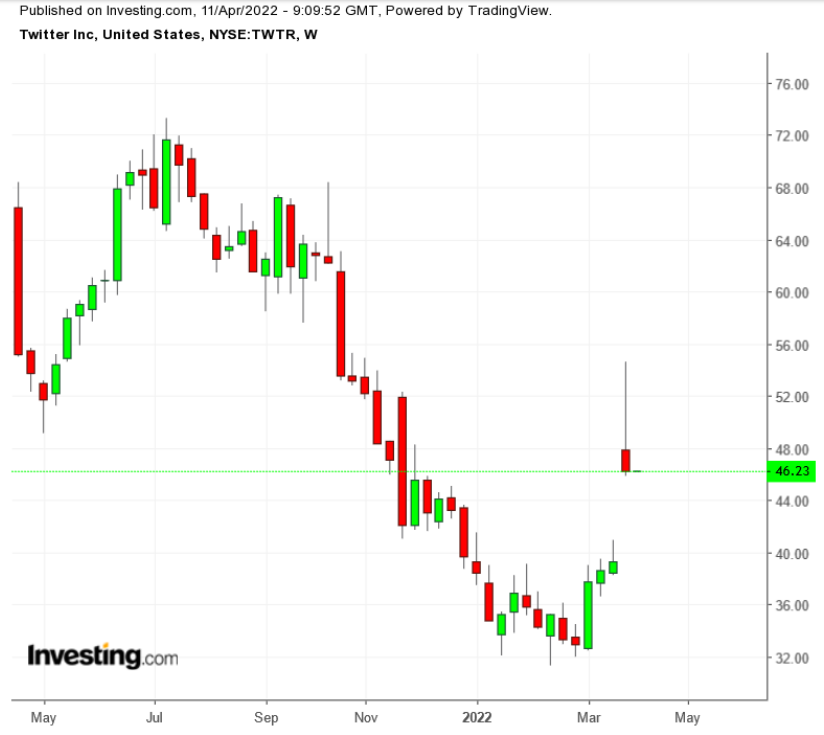This article was written exclusively for Investing.com
On Apr. 4, Elon Musk disclosed that he owned more than 9% of Twitter (NYSE:TWTR). The news that the Tesla (NASDAQ:TSLA) chief executive officer was now a major shareholder sent the social media stock up 27% that day, and another 2% during the following session.

Though initial burst of optimism has faded somewhat—TWTR declined 9% over the following three sessions—clearly, Twitter bulls still view Musk's ownership stake as a positive.
What's more, those bulls may well be right. After years of disappointing financials and middling stock performance, Twitter needed a jolt. The question is whether Musk's ownership will have an impact beyond the short-term boost to the stock.
To answer that, investors need to ask another question: what does Musk want from his investment in Twitter stock? There are a lot of potential answers:
Answer 1. Profit
To at least some degree, Musk's investment in Twitter was motivated by a desire to make money.
We know this to be true because of how Musk went about accumulating his stake. According to Form 13D filed with the U.S. Securities and Exchange Commission, Musk began buying TWTR stock on Jan. 31. It was more than two months before he disclosed those purchases via that SEC filing—and even that filing was late.
If Musk didn't really care what price he paid for Twitter, he could have easily announced his intentions, or at least hinted at them, ahead of time. He chose not to, preferring instead to buy up his stake (at a cheaper price) before the market knew of his plans.
To be clear, this is not a criticism. Musk is entitled to pursue profit, whether through Twitter stock or by any other means. And while Musk is now the richest person on Earth, even by those standards his investment in Twitter was not made with play money.
Musk spent some $2.64 billion acquiring his 9.1% stake. Yes, that's roughly 1% of his reported net worth—but according to the SEC filing, Musk paid cash for his shares.
Most of Musk's fortune is not liquid, even with his substantial sales of Tesla stock late last year. Musk certainly isn't risking his fortune on Twitter stock, but his stake, now worth $3.38 billion, cost a material portion of the cash available to him. And even for someone worth well north of $200 billion, $740 million in paper profits is nothing to sneeze at.
Answer 2. Fun
But, let's be fair. Profit isn't Musk's only motivation here. It's not as if the CEO of Tesla lacks for capital. And he's not Warren Buffett, who regularly buys large stakes in companies he believes to be undervalued.
Musk chose Twitter at least in part because he enjoys Twitter. He enjoys Twitter so much he wound up paying a $20 million fine over a Tweet—and claimed the fine was “worth it.” The CEO, who, on one hand, has helped fight climate change by manufacturing electric cars, has, on the other hand, quite often acted like a common social media 'troll.'
Being the largest shareholder in Twitter, no doubt adds some juice to Musk's experience on the site. He's already asked if the company should drop the 'w' from its name, floated turning Twitter headquarters into a homeless shelter, and provocatively questioned if the platform was dying.
None of those Tweets are out of line with Musk's long history of posting on the site. One imagines, however, that those Tweets are a bit more amusing to Musk, given his newfound stature as the company's largest shareholder.
Answer 3. Fixing Twitter
All that said, Musk has also made more serious comments about his new investment. Upon initially announcing he was joining TWTR's board, Musk tweeted that he was hoping to enact “significant improvements to Twitter.”
Last week, he repeatedly referenced a long-sought “edit” button, including creating a poll to gauge sentiment.
He's also offered recommendations for Twitter Blue, the company's subscription service.
Undoubtedly, Musk chose Twitter as an investment because he loves the platform. (He's Tweeted more than 17,000 times.) It seems clear that part of his motivation in originally saying he was joining the board was to fix what he sees as the platform's weaknesses.
But on Sunday, Twitter announced that Musk had "rejected its offer to join the social media firm's board." In a note posted to its platform this morning, CEO Parag Agrawal said, "the company's board held many discussions with Musk, but he did not state the reason for the Tesla CEO's decision."
Answer 4. Politics and Power
His abrupt about-face regarding Twitter's board notwithstanding, it's clear that Musk believes one of TWTR's significant weaknesses is its content moderation policy. Musk has repeatedly decried the platform as being against free speech.
In December, he re-Tweeted a meme that compared Twitter CEO Parag Agrawal to genocidal dictator Joseph Stalin. In March, while he was buying up TWTR stock (but hadn't yet disclosed those purchases), he created a poll about the platform's adherence to free speech principles. Below that Tweet, he noted that “the consequences of this poll will be important.”
It seems likely that Musk, when he considered taking a position on the board, planned to fight for more speech on the platform, not less. Indeed, Twitter employees had voiced concerns. And Musk's investment has stoked speculation that the end result might be a return of former president Donald Trump to the platform, after Trump was removed on Jan. 6, 2021.
Even with Musk's dramatic reversal on the board position, there's still an expectation, as Agrawal put it in his posting, of "distractions ahead," though he notes that "our goals and priorities remain unchanged."
What This All Means for Twitter Stock
No doubt, all of these reasons—plus others—were at play in Musk's investment. But each of those reasons has the potential to create quite a different outcome for Twitter stock going forward.
As noted above, this was a company that needed change, at least from a shareholder perspective. At the $39.31 close the session before Musk's stake was announced, TWTR stock traded below its first-day close back in 2013. (At Friday's closing price of $46.23 it's now about 18% above that level.)
The weak performance in the stock largely has come from weak performance in the business. In 2021, adjusted operating income (which excludes a one-time litigation settlement), was just 5% of revenue—an abysmally low figure for a platform business. User growth has mostly stalled out. Social media peers have lapped the company. Meta Platforms (NASDAQ:FB) is worth more than fifteen times as much as Twitter, and even Snap (NYSE:SNAP) has a market capitalization that's more than 50% higher.
Musk's involvement, given the sizeable nature of his stake, even if he's not sitting on the company's board, has at least the potential to fix some of those problems such as improving usage, growth, and profitability. But how long will his involvement really last?
Is Twitter stock just another version of Dogecoin for him, a cryptocurrency Musk seemed to toy with last year? If Musk is committed to change, is his sole aim—or even main goal—to improve profitability?
One Tweet last week seems to indicate that isn't necessarily the goal after Musk suggested that "Twitter offer...zero ads for users that pay for premium features."
Is Musk floating the removal of ads from the site to get people talking? Because he believes it will help revenue and earnings in the long run? Or because it will make Twitter better for him, and even the world?
We don't know precisely why Musk decided he's not joining the Twitter board of directors after all. Could it be because shareholder value isn't the most important of his goals?
Over time, we'll surely find out the answers to all of these questions. And undoubtedly, those answers may well have a big effect on where Twitter stock goes from here.
